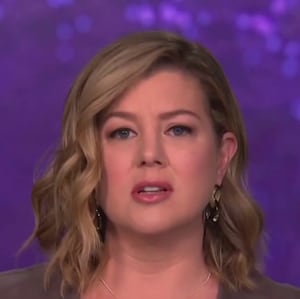Amid a flurry of post-election cable news shakeups earlier this year, CNN announced Brianna Keilar would move from her early afternoon slot to New Day, the network’s flagship weekday morning show, alongside John Berman. Keilar will replace longtime co-anchor Alisyn Camerota, who in turn will move to afternoons for a two-hour broadcast with Victor Blackwell.
Keilar, who has become well-known for her scathing “Roll the Tape” segments—which have called out what she described as “total bullshit,” frequently targeting the conspiratorial rhetoric of rival network Fox News—will officially make her debut on the New Day set this Monday.
Chatting via Zoom with The Daily Beast, Keilar and Berman talked about their competitors at Fox & Friends and MSNBC’s Morning Joe; how they plan to change the CNN morning broadcast; whether there’s a danger in giving airtime to known liars and peddlers of disinformation; and whether Keilar’s fiery fact-check segments will be a recurring feature of their show.
Rest assured, she said, “Roll the Tape” will, indeed, be a part of New Day.
“F yeah,” an excited Berman added.
The transcript below has been lightly edited for clarity.
What do you see for the direction of this new version of New Day? And what are your individual goals with this show in the first few months?
Keilar: I think we’re just going to have a very direct approach to the news. I think it’s going to be blunt. And I think people in the morning, a lot of times they’re getting ready, they don’t have—
Berman: Clothes. [laughter]
Keilar: Well that, but they also don’t maybe have a ton of time, but I think we’re not going to sacrifice—I guess what I’m saying is, I’m not saying we’re going to rush through stories. My point is, I think we’re going to leave them with something to take away that they didn’t have at the beginning so I think they were going to actually dig deep into the news, we’re not going to shy away from explaining things. I do think it’s going to be candid, I think it’s going to be blunt and just respecting their time obviously in the morning, too, as they may not have that much of it. But I think that when they tune in, they know they’re going to get something of value that they didn’t have before. When they, you know, walk away from our show.
Berman: Look, there’s a certain amount of space we can now occupy in the news universe because there’s no one else doing a straight news show in the morning, at the time that we’re doing. It just the other cables, this is not what they do. This isn’t, it’s not, you know it’s not their jam. The news is our jam. So there’s a huge amount of leeway, we have to do what we do inside that space.
So John, you’ve worked alongside Alisyn for years. Is it going to be strange to have a new full-time partner?
Berman: It’s always a change when you change partners. I will say that Brianna is one of the easiest human beings in the world to get along with, and you know, normal is not normal in the news business. Yet, she happens to be incredibly normal and I mean that in the nicest possible way. You could just have a normal human conversation with her. So in the vast experience I’ve had communicating with her, it’s just very natural, so I’m not particularly concerned that it will be a difficult transition. You know, coming from a broken home as a young child, it’s a unique situation to go from one partnership with someone who you really like in respect to another one with someone you really like and respect. You know it’s going from good to good, which is a nice place to be.
Keilar: John has had a number of co-anchors, which is funny, Alisyn, who I spoke with just here in the last couple of days, but Alisyn joked on the air that he really can’t hang on to a good woman. But, no, John is unique in that he has a number of past coworkers who loved working with him. So I feel very lucky because it’s like a new work partnership but there’s already a comfort level. And I think also it’s just one of the things that I really love about Berman. And I’ve been able to enjoy this about him, even not co-anchoring with him, but he loves the news, he’s so intensely curious, and he brings that to his job into viewers, and I like watching him on TV. And I loved when he would come on my show that I anchored by myself. I knew it was going to be a great segment but I wouldn’t be watching it even if I was anchoring it and enjoying it.
Berman: I don’t know if you [Keilar] remember this or if I had a chance to bring it up but more than once, I have written to you during your show, when you were on at 1 p.m., to say that I really like your show. And how it’s unusual, it just feels different, it’s refreshing, and I really dig what you’re doing. And I don’t do that with people, normally, because I don’t really don't like people. [Chuckles] But I remember that, I’m on the record, being a big fan of Brianna’s journalism.
I’m just curious. Have you guys ever had any experience co-hosting any hours together?
Keilar: I think we have once or twice, right?
Berman: I think so.
Keilar: It was the morning, and I think we were both filling in on—
Berman: New Day.
Keilar: It was. When you’re filling in on a morning show and generally not gotten the sleep and you’re not used to that schedule, so I, like, have this fever-dream memory of anchoring with John. So I have vagaries of positivity about John, because it knew it was someone who looked like you.
Berman: Exactly!
New Day experienced a ratings growth in 2020 and in the first quarter of 2021, but at the same time it’s still third place in total viewership to Fox & Friends and Morning Joe. As a new team, do you feel pressure to try to close that gap?
Berman: It gets back to what I was talking about. We're doing something just so different than they are, it's hard to compare us to what they're doing. We have a different audience and we have different target audience, let alone different audiences. So, I don’t see it necessarily as a direct competition like that—I really don’t, I never have. To me, the competition is against ourselves.
I want to grow—I mean, believe me—I want as many people to watch the show as humanly possible. And I judge it compared to what we’ve done in the past and how good I think we can be. But the other guys, come on, we’re not going to do what they do. So how are you going to—it’s not even worth comparing to somebody.
New Day has been more news-focused over the past few years, while most other morning cable programs are largely driven by partisan opinion and punditry. What do you make of your competitors’ approaches? And do you feel like a need to incorporate any of that style in your show?
Keilar: I really don’t like hypocrisy. I don’t, personally, I don’t believe in having a partisan show but I do believe that our viewers and Americans deserve the truth, and they deserve to hear from lawmakers and other elected officials who are going to tell them the truth, who are going to talk about how to address problems that affect their life, and that they’re going to talk about that in a way that is based in reality. And I think that is essential.
And so when I think about some of what we do, and I also think about John’s style in how he’ll just call things like he sees them, I think there is an argument to be made for accountability in how you cover the news. It’s not partisan to be on the side of facts, and to be on the side of news, and that’s what we’re going to do.
Berman: Yeah. It’s OK to take sides but you’re taking the side of truth—
Keilar: Correct.
Berman: —or taking the side of news. That’s the side I think that we choose to take.
Brianna, you talk about “accountability journalism.” You've drawn a lot of attention recently for your “Roll the Tape” segments, in which you colorfully take down or fact-check politicians and right-wing media figures. Is that a feature you plan on bringing to New Day?
Keilar: Absolutely. We’re bringing that.
Berman: F yeah!
Keilar: We are. Actually, there have been so many people on social media—viewers—who've reached out and said, you know they want to make the switch, and that is what they were looking to the afternoon show for, and they want to make sure that's going to be part of the morning show, and that’s the plan. That is what we’re going to be doing. So I think the things that viewers liked about our afternoon show they’re now just getting in a different time slot. We are definitely bringing that.
It’s worth noting that our executive producer is the executive producer who worked with me on the afternoon show. So it’s not going to be like a completely different thing. People who enjoyed watching the afternoon show I think will enjoy watching New Day. And John has been very, you know—John calls a spade a spade. So I think this is very much like a very good news marriage, sort of what I was doing in the afternoon, and what he does in the morning.
You were drawing a lot of positive notice but also some criticism for your willingness to bring on what we would call conspiracy theorists or known liars on your show to confront them face-to-face. What do you say to that criticism that you were just giving these folks a larger platform to amplify lies and disinformation?
Keilar: I think there’s a difference between amplifying a lie and cutting it down. And we’re pretty judicious—I think you will especially see that—and the stakes have been so incredibly high in the last year. It’s a fine line between obviously trying to figure out what is going on… needing to discuss what a candidate is about and amplifying something you don’t want to. So it’s something that on a case-by-case basis we definitely consider.
And I take that to heart, you know, this concern about amplifying something. We have tried very hard and I think succeeded in most of our efforts in not amplifying something, but revealing it for what it is, which in many cases is total bullshit. So I think there’s a value in that.
And do you plan on continuing those types of interviews—judiciously, as you say—on New Day?
Keilar: I think we’re going to be very selective. Because those concerns that you mentioned are ones that we have too.
So cable news may be dealing with something of a post-Trump ratings slump, and that’s industry-wide when it comes to viewership. Now that Biden is fully in office, there is less non-stop insanity like, say, the Capitol insurrection or the drama around the inauguration. Are you concerned about the current state of cable news?
Berman: I’m excited about the current state of news. We’ve had mornings where you have, like, deep, meaningful discussions about foreign policy that we just didn’t have for four years, or at least not like we’re having now, and it’s refreshing. And I think people want to see that. I think there’s an appetite for—look, I don't know if it'll rate higher or lower, but I do think there's an important appetite for that. And I think there's an opportunity to cover things that we haven't covered in different ways.
I really do think as a cable viewer occasionally, I’m excited for that. And, certainly, as you know as a journalist, you get tired of doing the same thing again and again and again. I will be thrilled when we don’t have to cover the pandemic anymore because it would mean that it’s over, among other things. So, we’re all ready for a new predicament.
Do you think it’s a good thing how cable news has become so personality-driven lately?
Berman: [chuckling] It depends. Do you think we don’t have a personality?
I didn’t mean it like that! But rather that it seems like everything is based on a host or a news anchor trying to insert their personality into the news itself. A good example would obviously be Tucker Carlson, but you do see this with—
Keilar: But that’s not personality.
Berman: You’re 0 for two on that one.
Keilar: That to me is not inserting personality. That is just, you know, what is that like—it’s a joke, it’s like one of those nasty mean jokes to me. I don’t see that as personality. I mean if you want to take people at their points of views, right, I guess you could say maybe that has to do with their inserting, like, their personal view on something.
I think it’s more about, you know, making themselves the story rather than the news itself being the story.
Keilar: That’s just chasing ratings, and I don’t see that as personality.
Berman: If people are tuning in because they want to see our takes on it or they like how we convey the information that’s—if people want to like me, that’s awesome, I’m all for it. I want people to know that they’re going to find out more information on our show than anywhere else in the most concise, interesting way. That’s what I care most about. If they want to like me in addition to that, that’s terrific.
Keilar: Also I think it’s about fitting what is happening today, or in this moment, in the larger context. I think when we’re in news, we tend to—we follow obviously the news day to day, and you have a sense of how you insert what is happening into, you know, remembering what happened a week ago or five years ago or in the case we’re talking about the Afghanistan War wrapping up, you know, decades ago. But a lot of viewers, I think, it helps to kinda fit it into a context for them. It’s so easy to forget what happened, and to sort of see how things play out over time and why this moment is this point on a timeline. And I think we’re going to talk about things like that, too—to put them into context and also to remind people honestly what they already know.









